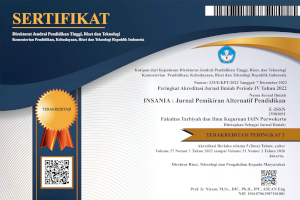NILAI MODERASI ISLAM DAN INTERNALISASINYA DI SEKOLAH
DOI:
https://doi.org/10.24090/insania.v25i1.3365Keywords:
Islamic moderation values, internalization, official curriculum, hidden curriculumAbstract
The growth of radical movement has been spread in education areas today, particularly in school. The growth is systematically need to be prevented. In Islamic educational context, the action that should be put is through internalization of Islamic moderation values in school. The Islamic moderation values that include tolerant, justice, balance (harmony), and equality can be fostered by education of Islamic religion (PAI) as the basic of the development. There are two important models that should be concerned with the internalization, i.e through official curriculum and hidden curriculum. Of course, the official curriculum should be the basic of the internalization, but it is not enough, it necessary to strengthen through hidden curriculum by construct the socio-cultural context that support to the transformation of Islamic moderation values in the school environment. If this process is runing well, the internalization of Islamic moderation values will reach to the optimal result and surely weaken the spread of Islamic radical movement. This article will explore and analyse the models of internalization especially on hidden curriculum in the schoolDownloads
References
Al-Qardhawi, Yusuf., 1997. Wasatiyyah al-Islam. Islam Moderate Legislation for Progressive Nation. Terj. Ahmad Umar Hisyam &Muhammad Higab. Cairo: al-Azhar
Apple, William W., 2004. Ideology and Curriculum. New York: Routledge Falmer
Arifin, Syamsul., 2014. “Membendung Arus Radikalisasi di Indonesiaâ€, dalam ISLAMICA: Jurnal Studi Keislaman, Vol. 8, Nomor 2
Baidhawi, Zakiyuddin., 2007. Pendidikan Agama Berwawasan Multikultural. Jakarta: Erlangga
Giroux, Henry A., 1983. Theory and Resistance in Education: A Pedagogy for The Opposition. Massachussets: Bergin & Garvey Publisher Inc.
Harto, Kasinyo., 2014. Model Pengembangan Pendidikan Agama Islam Berbasis Multikultural. Jakarta: Raja Grafindo Persada
Hermawan, M. A., 2015. “Islam Inklusif dalam Kurikulum Pendidikan Agama Islam SLTAâ€, dalam Jurnal Penelitian Agama (JPA), Vol. IX, No. 1, Jan-Jun
Hilmy, Masdar., 2013. “Whither Indonesia’s Islamic Moderatism? A Reexamination on the Moderate Vision of Muhammadiyah and NUâ€, dalam Journal of Indonesian Islam, Vol. 07, Number 01, June
Misrawi, Zuhairi., 2010. al-Qur'an Kitab Toleransi: Tafsir Tematik Islam Rahmatan lil Alamin, Jakarta: Pustaka Oasis
Nata, Abuddin, 2016. “Islam Rahmatan Lil Alamin sebagai Model Pendidikan Islam Memasuki ASEAN Communityâ€, Makalah Kuliah Tamu Jurusan Pendidikan Agama Islam Fakultas Ilmu Tarbiyah dan Keguruan UIN Maulana Malik Ibrahim Malang Senin, 7 Maret
PPIM UIN Jakarta, 2017, Api dalam Sekam: Keberagaman Gen Z (Survei Nasional tentang Sikap Keberagamaan di Sekolah dan Universitas di Indonesia. Jakarta: UIN Jakarta
Schugurensky, Daniel, 2002, “The Eight Curricula of Multicultural Citizenship Educationâ€, dalam Multicultural Education. Fall 10.1
Shihab, M. Quraish, 2007. Secercah Cahaya Ilahi: Hidup Bersama Al-Qur’an. Bandung: Mizan
Suharto, Toto, 2014, “Gagasan Pendidikan Muhammadiyah dan NU sebagai Potret Pendidikan Islam Moderat di Indonesiaâ€, dalam ISLAMICA: Jurnal Studi Keislaman. Volume 9, Nomor 1, September
----------- 2017, “Indonesiasi Islam: Penguatan Islam Moderat dalam Lembaga Pendidikan Islam di Indonesiaâ€, dalam Al-Tahrir, Vol. 17, No. 1 Mei
Wren, David J., 1999, “School Culture: Exploring The Hidden Curriculumâ€, dalam ADOLESCENCE, Vol. 34, No. 135, Fall
Downloads
Published
How to Cite
Issue
Section
License
Authors who publish with this journal agree to the following terms:
Authors retain copyright and grant the journal right of first publication with the work simultaneously licensed under a Creative CommonsAttribution-ShareAlike License that allows others to share the work with an acknowledgment of the work's authorship and initial publication in this journal.
Authors are able to enter into separate, additional contractual arrangements for the non-exclusive distribution of the journal's published version of the work (e.g., post it to an institutional repository or publish it in a book), with an acknowledgment of its initial publication in this journal.
Authors are permitted and encouraged to post their work online (e.g., in institutional repositories or on their website) prior to and during the submission process, as it can lead to productive exchanges, as well as earlier and greater citation of published work (See The Effect of Open Access).








